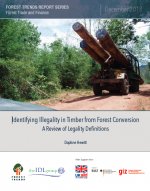Identifying Illegality in Timber from Forest Conversion
A Review of Legality Definitions
By Daphne Hewitt View PublicationFLEGT Voluntary Partnership Agreements (VPAs) aim to verify and license legal timber for export to the EU in order to create a ‘market access’ incentive for legal operators and countries that wish to improve forest law enforcement and governance standards. Licensing is based on a Legality Assurance System (LAS), which is underpinned by a national Legality Definition.
Beginning a credible domestic stakeholder process to identify appropriate laws and detailed verifiers for compliance are necessary pre-requisites to formal bilateral negotiations with the EU.
VPAs were primarily conceived of with selective logging in production forests in mind, but recent data suggests that conversion timber (timber produced when land is cleared for other uses) is increasingly important in tropical production, and
in some countries may represent a significant majority of wood production. In addition, agricultural conversion is now acknowledged as the most significant cause of deforestation and is closely associated with land/tenure conflicts with local communities. Assessing the legality of conversion timber requires that compliance with both the process of permit allocation
and all relevant management requirements be examined. On this basis, in the countries reviewed in detail by Forest Trends, a significant majority of the conversion timber produced appears to be illegal. This paper therefore reviews the Legality Definitions of the six counties engaged in VPA implementation, with a view to determining the potential that they offer for identifying illegality in wood sourced from conversion of forest to non-forest uses.

